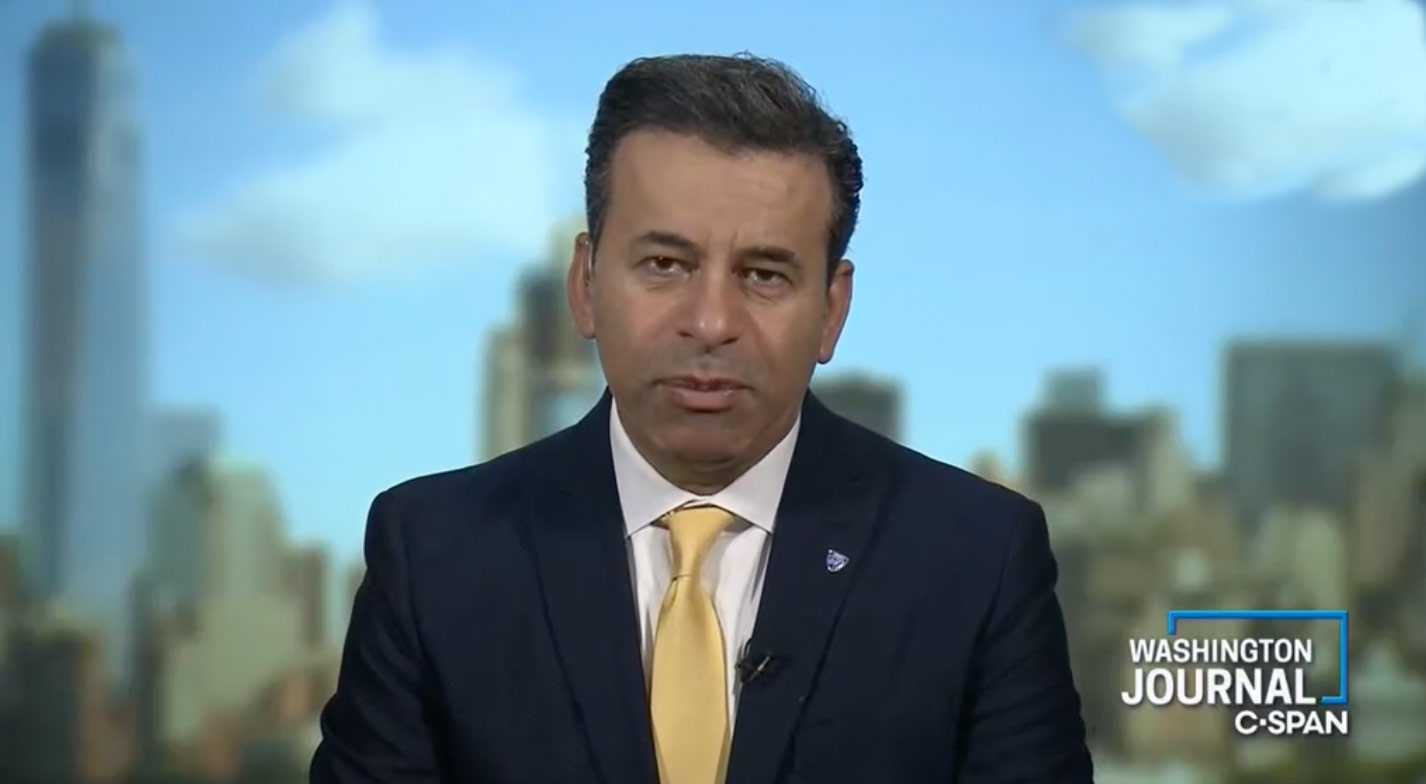

Martin (Marty) Makary is a surgeon and public policy researcher at Johns Hopkins in Baltimore. He is also a prolific author and has been in the forefront of public commentary on the health care system for several years. He is highly published not just in the medical literature (250 peer-reviewed articles) but also in the lay press (Wall Street Journal, NYTimes, Washington Post and USA Today) and cable TV (CNN and Fox News).
Makary has long been a vocal critic of the American health care system and what he calls the “medical establishment.” His reputation is that of a disruptor. At the same time, Makary is well-respected within the medical community. In 2018, he was elected to the National Academy of Medicine.
He believes that the medical establishment is too entrenched in its traditions and needs to be disrupted to provide better medical care including the use of alternative medicines. While Makary positions himself as a medical system disrupter, he does have a strong reputation for being scientific evidence based and an incrementalist when it comes to changes needed in the medical system.
Makary was very vocal during the COVID-19 pandemic and was critical of how the U.S. Food and Drug Administration (FDA) managed it. He favored masking as a means to control the spread of COVID-19, but opposed vaccine mandates once the vaccines were approved. He also opposes the need for booster shots, believing that natural immunity is sufficient.
The title of his latest book, “Blind Spots: When Medicine Gets It Wrong and What It Means for Our Health,” expresses his views of the medical system. In a podcast interview with Russ Roberts on August 15, 2024, Makary summarized:
“The fact that every cell is connected, every disease is interrelated to five basic principles of health that we don’t talk about that we need to talk about: General body inflammation, mitochondrial health, food as medicine, micronutrients, the role of the microbiome, and the hormone systems in the body.
And, so there’s no one specialty for the microbiome or food as medicine. We have these silos based on these old-fashioned NIH (National Institutes of Health) funding centers.
And so, a new generation of doctors now are saying: Maybe we need to treat more diabetes with cooking classes than just throwing insulin at people. Maybe we need to treat more high blood pressure by talking about the quality of one’s sleep and stress, not just throwing antihypertensives at people. Maybe we need to treat more childhood obesity by talking about school lunch programs, not just putting every kid on Ozempic. Food as medicine: the role of the microbiome. Maybe we need to study the environmental causes of cancer, not just the chemotherapy to treat it.
We have the most over-medicated generation in human history. And the path that we’re on is not a good path. Pretty soon every teenager is going to be on multiple medications on the trajectory that we have now. Maybe we need to look at communities, addressing loneliness, frailty, and seniors.
So, there is a recognition now that we’ve got to do things differently, and actually a business model for people to develop point solutions and graft it into the current system. And we’re seeing that disruption slowly.
in his books, Makary has expressed views about innumerable topics: COVID-19 vaccines, mandates and boosters, overuse of antibiotics, underuse of estrogen for hormone replacement, peanut allergies, avoiding appendicitis surgeries, nursing shortages, banning smartphones in schools, how the system has caused medical debt, the need for hospital transparency, etc. His views on these topics generally have support in scientific evidence—again, while he is a medical system contrarian, he does justify his views with evidence and peer-reviewed studies.
The underlying theme of his views is that very often medical decisions are not based on science but rather on the way that medicine is traditionally practiced and medical judgments have been made, as well as the financial incentives built into the current medical system. He believes the present medical system needs disruption in order to provide better care.
On his own website, Makary summarizes the thrust of his latest book:
Could it be that many modern-day health crises have been caused by the hubris of the medical establishment? Experts said for decades that opioids were not addictive, igniting the opioid crisis. They have been refusing menopausal women hormone replacement therapy, causing unnecessary suffering. They demonized natural fat in foods, driving Americans to processed carbohydrates as obesity rates soared. They told people there are no downsides to antibiotics and prescribed them liberally, causing a drug-resistant bacteria crisis.
When modern medicine issues recommendations based on good scientific studies, it shines. Conversely, when modern medicine is interpreted through the harsh lens of opinion and edict, it can mold beliefs that harm patients and stunt research for decades. Dr. Makary reveals the biggest blind spots of modern medicine and tackles the most urgent yet unsung issues in our $4.5 trillion health care ecosystem. The backstories behind the medical dogma that is propagated for decades can be absurd, entertaining, and jaw-dropping—but the truth is essential to our health.
Potential Impact on FDA
Unlike Robert F. Kennedy Jr., who has been very critical of the FDA, especially its nutrition division, Makary does not appear to have taken strong views on FDA, per se, other than on how it handled COVID-19. His books and statements, while they often deal with specific drugs such as estrogens or opioids, or food use such as peanut allergies, focus more on how the medical establishment manages health matters rather than on product decisions made by FDA.
Vaccine issues seem to be a litmus test for Kennedy’s decision to nominate people for agency leadership in the U.S. Department of health and Human Services. Makary has said he is not anti-vaccine, per se, but has expressed skepticism about vaccine mandates, specifically involving COVID-19. However, FDA does not establish mandates—they are guided by CDC and implemented by the states and localities. As commissioner Makary could influence mandates, especially given the public platform provided by FDA, but based on his statements, it appears unlikely that he will advocate for removal of any vaccines from the market. He could support Kennedy’s call for more research into vaccine safety, for existing vaccines and certainly for vaccines in development.
Makary has criticized FDA approval of opioids and their current abuse and overuse. This has led him to urge more testing for safety and effectiveness and approvals based on meaningful outcomes for patients.
Kennedy has proposed ending user fees for drug and device reviews. User fees support a substantial portion of the FDA budget. Eliminating them would upend the FDA budget. The system of user fees is based on legislation that needs to be passed by Congress every five years. The current legislation authorizing user fees expires in 2027. If new leaders at HHS and FDA oppose renewing user fees, which until recently has been viewed as unthinkable by the FDA stakeholder community, Congress would have to almost double its current appropriation if FDA is to continue to function as it does now in terms of drug and device application reviews.
Another issue that may arise is direct-to-consumer (DTC) TV advertising. FDA permits such advertising via its issuance of requirements for disclosure of safety and other information. FDA has the authority to alter its current standards, which would have the effect of discontinuing DTC TV advertising as we now know it. Kennedy has said he opposes DTC TV advertising; Makary does not appear to have taken any position on DTC TV advertising. If Makary and FDA seek to reduce DTC TV advertising, it would affect how many drugs are currently marketed. A ban on such advertising undoubtedly would strenuously be opposed by TV networks who derive substantial income from TV ads.
In terms of foods, based on his statements it appears likely he will seek to drive the food industry toward producing what he would regard as healthier foods as a means to address chronic illnesses. While Kennedy has criticized FDA’s nutrition division, in fact it would be in lock-step with such efforts. FDA has no direct power to tell food manufacturers what ingredients should be in their products. But it does oversee the approval of and use of food additives and food/cosmetic colors, so Makary could seek to require a re-examination of the basis for approving food and color additives. And he is likely to favor more research on ultra-processed foods and chronic diseases.
Based on his writings, Makary’s likely targets could be:
- Women’s health, as he has published on estrogen hormone therapy, which he thinks is underused, and ovarian cancer (one of his surgical specialties);
- The need to consider alternative, non-medical treatments for certain diseases, since he believes the country is over-medicated;
- The overuse use of antibiotics (which has been a concern of every FDA commissioner for decades;
- The vaccine mandates, which FDA can influence but not set;
- Encouraging more nutritious foods and the use of foods as medicines, which will be consistent with Kennedy’s priorities; and
- The role of FDA in working with Medicare (and Dr. Mehmet Oz) on establishing the right incentives in the medical system to encourage wellness rather than just treat disease).
In addition to these issues, there are many other challenges that any new leader of FDA will face: how to use and regulate artificial intelligence (AI), how to strengthen staff capabilities in medical innovations such as cell and gene therapy, how to manage a recent Supreme Court decisions that enables judges to overrule FDA scientific decisions, the FDA budget (especially user fees), how to facilitate the approval of more generic drugs and biosimilars to reduce drug prices and so many more.
Makary is an excellent communicator with strong, often persuasive and articulate science-based views on innumerable health and medicine topics. At FDA he will have a powerful platform to express these views, and public communications could form the basis for his most significant and impactful influence.


